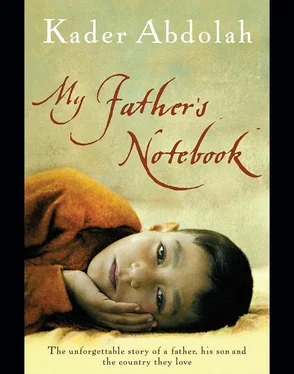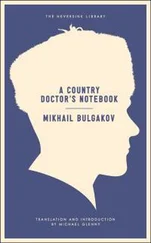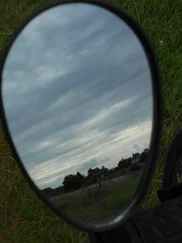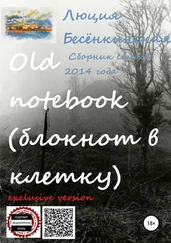Who could it be? Golden Bell? A friend of hers? Did my father know? I had no idea and it was none of my business. I was the stranger here. I needed to disappear, to get away from my father’s shop.
I’d left my flat, got rid of the stencil machine, and abandoned the car. Next I had to dispose of myself. I’d never expected to be in a situation like this. Since I realised that the police might pick me up if I headed into town, I started walking in the opposite direction.
An hour’s walk put the city behind me. I saw the mountains, then the snowy peak of Saffron Mountain. I felt like an apple that had fallen from the bough. It could never be put back. My only option was to follow the path to the other side of Saffron Mountain. Flee my country? I’d never given it a moment’s thought.
How could I leave my father, my mother and my sisters? I hadn’t even said goodbye to my wife and daughter. No, the least I could do was to call Safa and let her know I’d be gone for a few months — maybe more, maybe less.
I retraced my steps to my old neighbourhood, where there was a phone box. I dialled the number of Safa’s grandmother. My wife would know immediately that it was me. Who else would call in the middle of the night? She picked up the phone after only a few rings.
“Hi, it’s me,” I said hurriedly. “How are you? How’s Nilufar? Listen, I’ve only got a couple of coins. I just wanted to let you know that I’m going away for a while.”
“Going away?” she said sleepily. “For how long? Where?”
“I don’t know. But I have to go. I’ll let you know as soon as I’m safe. Say hello to Grandma for me. I love you.”
“Me, too. Good luck.”
Reality was cruel. We had to keep the conversation short — she knew that. You had to put your emotions on hold. Political activists weren’t allowed to make long phone calls. You were supposed to deliver your message in a few short words, then hang up.
I always thought that at such a moment my wife would say, “Wait, you can’t just leave us like this! OK, I suppose I have only myself to blame, since you made your choice years ago. I should have known you’d sacrifice me so you could follow your dream!”
But she didn’t say anything of the kind. To my surprise, she was relieved that I was going. She must have instinctively felt that the path to Saffron Mountain was the only path to her liberation as well.
As I was leaving the phone box, I saw people walking down the street and realised that it was Friday.
My father, like all good Muslims, always went to the bathhouse before sunrise and then to Friday prayers in the mosque. It was a ritual he’d followed his entire life. When I was little, I used to go with him. He woke me every Friday morning and handed me his towel and various toiletries in a toilet bag. Then he set off at a brisk pace, with me following sleepily behind.
I looked at my watch. The sun would rise in half an hour. If I hurried, I could catch him somewhere between the bathhouse and the mosque. I headed for the mosque. It was no longer dangerous to walk or even run through the dark city, since everyone would think you were hurrying to prayers.
• • •
I went into the mosque along with the other men and peeked through the window of the prayer room to see if my father had arrived. He hadn’t. So I turned and walked back in the direction of the bathhouse.
What if today, of all days, he wasn’t coming to the mosque? What if whatever was going on in our house had kept him away?
As I came out of the side street, I suddenly saw his silhouette and recognised his footsteps. He walked with a kind of shuffle, especially now that he was old.
I ducked out of sight. He passed me by, lost in thought. I trailed after him, then gently tapped him on the shoulder. He turned. “Salaam,” I signed.
He looked at me in surprise.
“What are you doing here?” he signed back. “Have you been to the shop?”
“I need to talk to you,” I signed. “I’ve come to say goodbye.”
“What?”
“I’m going away.”
“Where?”
“To Saffron Mountain. And then to the other side.”
“The other side?”
He was silent. He knew what that meant. When he was a child, he used to see people sneaking through the almond grove in the dark and asking for food on their way to the other side. He’d also seen the gendarmes arrest numerous men and women, and watched as they were handcuffed, pushed into jeeps and driven away.
“When are you leaving?” he signed.
“Soon, before the sun comes up.”
“But you don’t have any food. Wait, I’ll go and get you some bread.” He hurried off towards the bakery, which was always open early on Fridays.
Did my father realise what it meant to flee one’s country? I hadn’t expected him to react so calmly. Perhaps he was going to the bakery to give himself time to think.
He came back with a long flat bread, which he folded in half like a newspaper and wrapped in a handkerchief before handing it to me. “Here, you’ll need this.”
We walked out of the city and headed towards the mountains.
In the glow of a streetlamp I told him briefly what had happened: that my comrades had been arrested and that the secret police would catch me if I didn’t leave. I explained that I’d left my car under the tree behind his shop and shoved the key and the vehicle registration papers through the window of his lean-to. I watched his face to see if he knew that someone was in the lean-to. There was no reaction.
I wanted to ask him about it, but decided not to. If he knew, he could have told me, and otherwise it was probably Golden Bell’s secret, in which case he didn’t need to know. So I let the matter drop.
The sun would soon be up and for the first time ever my father would miss his Friday prayers.
“Aren’t you going to the mosque?” I asked.
“No,” he replied.
I realised then that he understood what my going away meant.
We came to the cemetery, the one the mothers went to early in the morning. They arrived with carpets under their arms to visit the graves of their executed sons and daughters.
In those days, many of the young men and women who opposed the mullahs were being executed. At first the families weren’t allowed to bury their children in a cemetery. Later on, this rule was changed, but the families were forbidden to visit the graves, which is why the mothers stole through the darkness to the cemetery on Friday mornings.
I walked hesitantly beside my father to the grave of my recently executed cousin and friend Jawad. I knelt by his grave and tapped his headstone with a pebble to wake him up. “Good morning, Jawad,” I said. “I’m going away.”
The sun rose above Saffron Mountain. My father took off his coat.
“Here, take it. It’s cold on the other side of the mountain,” he signed.
“No, you keep it, or else you’ll catch cold,” I signed back. He refused.
To this day I still have his coat — his worn black coat — in my wardrobe.
He pointed towards the mountains. “You know the way. You won’t have any trouble getting to the top of Saffron Mountain. When you get to the other side, keep moving, because the sun never shines on that side in the afternoon and the wind blows hard at night.
“Don’t stop and rest when you get tired, but keep moving. You mustn’t forget that. And stay away from the railway, otherwise the gendarmes will be able to follow your tracks.
“When you get to the top, take the other path, the one the mountain goats use. Then no one will be able to see you, not even with binoculars.”
I wanted to say that I was only going away for a little while and that I’d be back soon, but the words stuck in my throat. I wanted to look into his eyes, but he never gave me the chance. Instead, he looked down at my feet and said, “You aren’t wearing the right shoes, but you’ll manage.”
Читать дальше












